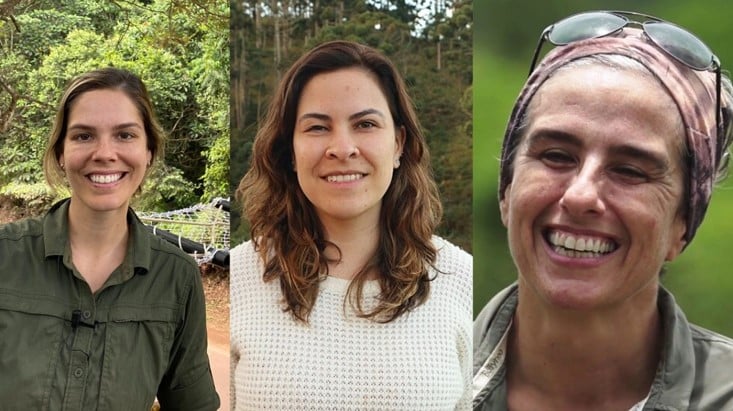In addition to visibility, recognition of the researchers’ work by renowned institutions is strategic for the continuity of research in the projects. Gabriela Rezende, Patrícia Medici and Fernanda Abra lead projects aimed at conserving Brazilian biodiversity, through different projects, check them out.
Gabriela Rezende
For a decade, researcher Gabriela Rezende has been the coordinator of the Black Lion Tamarin Conservation Program that gave rise to IPÊ – Ecological Research Institute. In celebration of Women’s Month, March, Gabriela received recognition from the Disney Conservation Fund, one of the Program’s main funders, as one of 11 incredible women making a positive impact on conservation around the world, in addition to the amount of 50 thousand dollars that will be invested in the program.
“With the resources, it will be possible to advance population management actions for the black lion tamarin (Leontopithecus chrysopygus) and the Pontal do Paranapanema habitat, to consolidate our One Health program and advance research using bioacoustics and the impact of climate change on tamarins, in addition to developing various environmental education and communication actions”.
Among the main results obtained by the project, together with a true network of partners, supporters and financiers, is the improvement in the situation of the black lion tamarin (Leontopithecus chrysopygus) which in 2008, after 24 years of actions aimed at its conservation, became from “Critically Endangered” to “Endangered” on the International Union for Conservation of Nature (IUCN) red list.
Patrícia Medici
INCAB’s (National Initiative for the Conservation of Tapirs) researcher and coordinator, an IPÊ project, she is among the five women granted Women of Discovery Award, uma premiação da WINGS World Quest – a non-profit organization that finances and enhances research on visionary women around the world.
“The WINGS Women of Discovery Awards is extremely prestigious! This organization works hard to empower women in the world of research and nature conservation. There is a prestige associated with being part of this select group, but a financial contribution also comes along with the award, worth 20 thousand dollars, to strengthen our tapir conservation efforts in Brazil. Additionally, the award is a huge opportunity to reach new audiences, such as the people who will be present at the awards ceremony in New York in October. It is also an opportunity to talk, in Brazil, about another award in favor of tapirs and thus highlight the importance of conserving the species”, highlights the researcher. With the award, Patrícia Medici becomes a fellow of WINGS and joins a community of more than 100 women scientists and conservationists who have been awarded since 2003.
INCAB research started in 1996, in the Atlantic Forest of Pontal do Paranapanema. In 2008, the project expanded its actions to the Pantanal. In 2015, studies of the tapir began in the Cerrado and, in 2021, it began operating in the Amazon. Recently, in 2023, the project began expanding its efforts to the Caatinga. The project has the largest database on the species in the world.
Fernanda Abra
The researcher associated with IPÊ Fernanda Abra was recognized in May with the Whitley Prize, from the British organization Whitley Fund for Nature (WFN), considered the Oscar of Nature Conservation, for the work she develops in the “Reconecta Project”, with institutional support from IPÊ. This is a project in which Fernanda builds low-cost canopy bridges and monitors arboreal mammals on the BR-174 highway, one of the highways that crosses the Amazon Rainforest (in a region between the states of Amazonas and Roraima). So far, 30 artificial bridges have been implemented. Fernanda is also a professor at ESCAS, the Institute’s school, and a collaborator on the institution’s projects with the same focus, protecting wildlife from the impact of highways.
“I was very honored by this award, firstly because I will be able to expand actions in the Amazon, and secondly because I could count on super committed supporters, such as the indigenous population, IBAMA, DNIT (National Department of Transport Infrastructure), IPÊ, UFAM – Federal University of Amazonas and the Smithsonian. We need more institutions and bodies interested in creating more sustainable highway models for wildlife”.
The team recorded 500 successful crossings over an 11-month period. In 2022 alone, the artificial bridges have already been used by eight tree species, including the golden-handed marmoset – an important cultural symbol for the Waimiri-Atroari, a local indigenous community that actively participates in the project.


